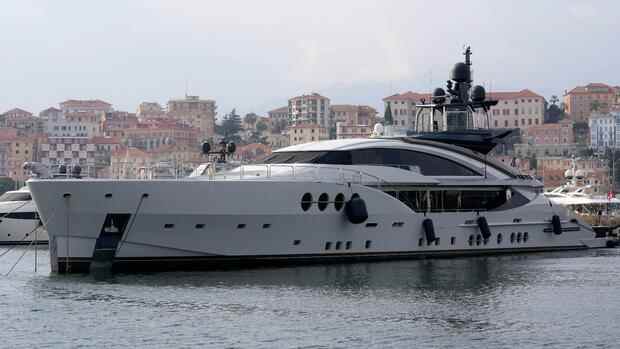The ship of the oligarch Alexei Mordashov was arrested in Italy.
(Photo: AP)
Cologne Oliver Wieck, Secretary General of the German National Committee of the International Chamber of Commerce (ICC), considers the international sanctions against Russian oligarchs to be justified. “Due to the severity of Russia’s attack on Ukraine, which violates international law, there can be no doubt about the proportionality,” Wieck said in an interview with the Handelsblatt. In many cases, it can now be clearly proven that the oligarchs contributed to the financing of the Russian war machine.
Wieck represents the international interests of the private sector vis-à-vis the German government and within the global ICC organization. This includes promoting free world trade and safeguarding the principles of the free market economy and free enterprise. The members of ICC Germany include companies, trade associations and chambers of industry and commerce.
Between 2000 and 2008, the lawyer was Managing Director of the Eastern Committee of German Business and previously held various positions in BDI foreign trade.
Read the interview here:
Mr Wieck, the EU, Britain and the US have imposed sweeping sanctions on Russian oligarchs over Russia’s attack on Ukraine. What is the legal basis for such sanctions?
The European Union has issued a series of regulations sanctioning Russia’s economic and financial sectors. In addition, more than 20 oligarchs were sanctioned. Among other things, this freezes their assets in the EU and restricts their freedom to travel. The EU is sovereign with regard to such sanctions. The regulations come into force in the EU member states without the need for their own national laws.
Top jobs of the day
Find the best jobs now and
be notified by email.
The oligarchs are accused in particular of being close to Russian President Vladimir Putin. Is it possible to lump all oligarchs together?
In each individual case, reasons must be given as to why an oligarch was placed on the sanctions lists. Ultimately, it is about sanctioning people because they have benefited from Putin or because they have supported him financially or in some other way. In general, the sanctions must not be disproportionate.
However, given the severity of Russia’s illegal attack on Ukraine, there can be no doubt as to its proportionality. In many cases, it can now even be proven that the oligarchs helped finance the war machine.
The lawyer is Secretary General of the German National Committee of the International Chamber of Commerce.
(Photo: ICC Germany)
The sanctions mean that the property rights of the oligarchs are severely curtailed: accounts are frozen, yachts are confiscated and property confiscated. How far can sanctions go?
In the EU, assets are initially only frozen, so the oligarchs can no longer dispose of them. The UK sometimes goes even further and dispossesses the oligarchs. This too can be justified if the assets can be attributed to the oligarchs. That’s not always easy.
>> Read here: “Exclude more banks from Swift”: Dutch finance minister calls for tougher sanctions on Russia
In the EU, the individual countries have to implement the sanctions. How does that go?
It is correct that the enforcement of the sanctions is the responsibility of the individual states and their authorities. In Germany, the Federal Office of Economics and Export Control (BAFA), an agency of the Federal Ministry of Economics, is responsible for this.
What legal options do the oligarchs have to defend themselves against the sanctions? Would the ICC also be an institution where legal disputes could be settled?
In principle, oligarchs also have the opportunity to take action against the sanctions. Such disputes must be settled in state courts, arbitration proceedings are not possible.
Not only the oligarchs are affected by the sanctions, but also contractors, such as shipyards that build yachts for their wealthy clients. Can you sue for damages?
The federal government has signaled that it will cushion the unwanted negative effects of the sanctions on German companies. Whether this also includes the shipyards, I cannot say. However, there should probably not be any individual compensation.
Mr. Wieck, thank you very much for the interview.
More on oligarchs:
